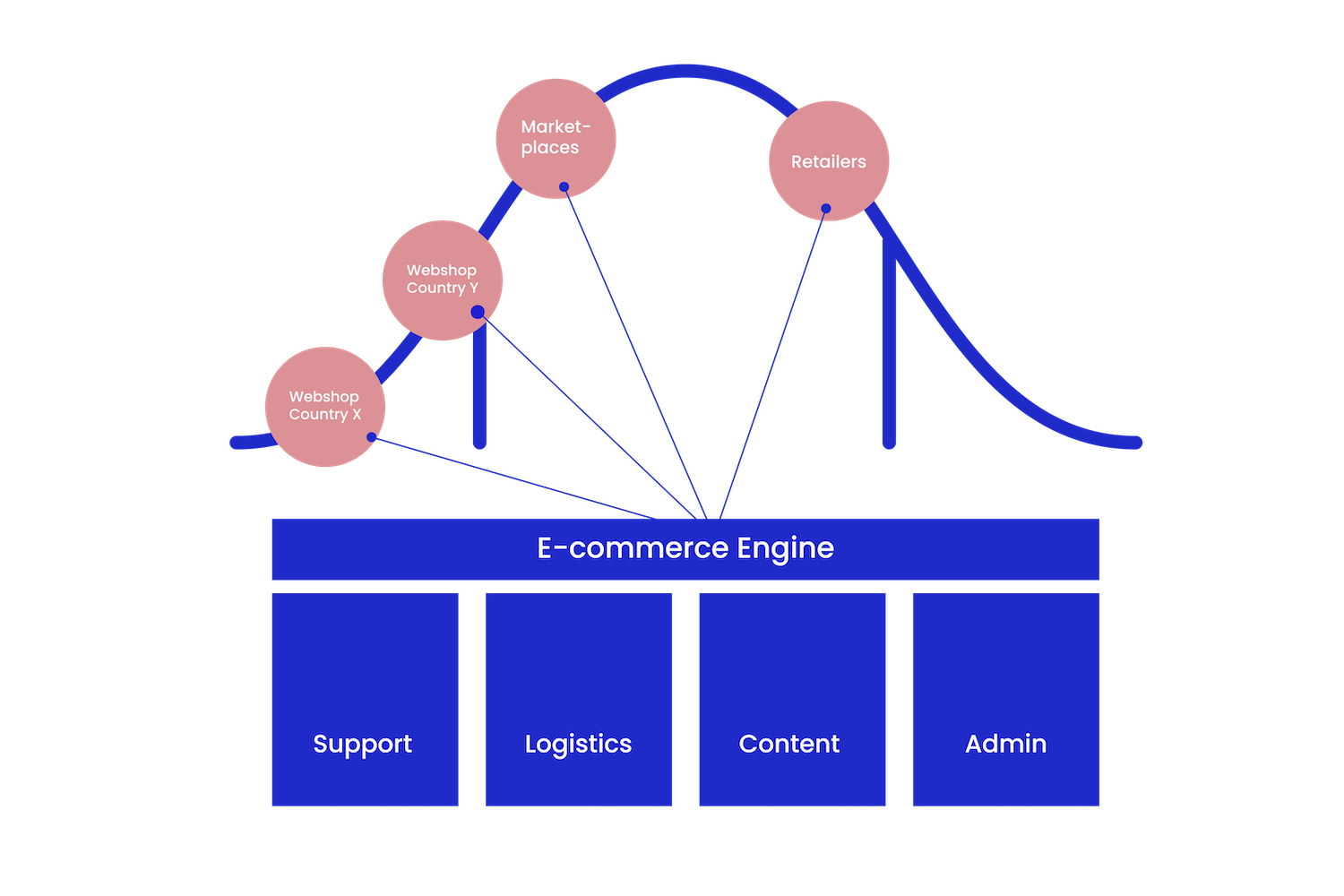 Importance of an e-commerce engine 🚂
Importance of an e-commerce engine 🚂
GENERAL
Jan 13, 2022 - 8 min read
As indicated in our previous blogpost it might be a good choice to combine your own online store with some more sales channels. As a result the workload and the complexity of your company will go up significantly. How should you handle this? Well you should start thinking about your “E-commerce Engine”.
Am I the one who was smart enough to think of this next part? Absolutely not, all credits go to Jonathan Gillyns and if you want to hear it directly from him you can listen to the podcast we did together with him.
So what is an "E-commerce Engine" exactly? Well it’s the core of your e-commerce company that makes sure everything runs smoothly and if it’s built correctly it makes sure you can scale a lot faster.
That might sound a bit generic but it’s actually the flow of processes and actions that happen behind the scenes.
Amongst other things this includes:
- Purchasing: makes sure you order the necessary products in time.
- Inventory management: if you work with multiple warehouses, make sure the stock allocation is optimised for maximizing revenue.
- Content management: making sure the right photos, text, prices are shown on the right platform.
- Delivery: making sure people get the right goods as fast as possible.
- Customer service: Making sure you can help your customers ASAP.
Now the one thing that differentiates good and bad engines is End-to-end thinking. Thinking horizontally throughout the full journey rather than thinking in silos.
A simple example: where is the information that a customer support officer needs? In an ideal world this person has one system where all information can be found (order number, ordered items, order status, tracking code, …) but in reality this person has to find the order in Shopify, than go to the logistic software to find the tracking number to finally end up in the PostNL track and trace to find the status of the order to than personally respond to that customer in Gmail on what to do.
Why is it that this doesn’t get a lot of attention and why is it that it’s often so badly structured at companies? We think it is because e-commerce companies will rely on agencies or freelancers who will be experts in either:
- Digital marketing
- Front end development
- Back end development
Almost none of them will have the End-to-End e-commerce journey in mind. The person who builds your back-end should completely understand:
- How your customer journey works
- What the difficulties are in handling the admin flows in e-commerce
- What questions are asked most often by customers and what info is needed to solve this
But let’s face it. This almost never happens because the experts you work with will come at it from one vertical or silo. In most cases they’ll lack the experience of what it takes to successfully run a fast growing or bigger e-commerce company. And yes, that’s where we believe we make the difference with dear digital. We have experts in almost all the different verticals and experience in scaling e-commerce companies to >30 million a year.
How can you assess if your processes in place are any good? Well the best advice we can give you is to “Go for a digital process supported by people instead of people supported by digital processes or tools”. If you want to build a successful e-commerce brand this is one of the most important things to keep in your mind while (re)designing your workflows and processes.
This might sound complex and something that is only for big companies. But if you are ambitious you should be thinking about these things from day 1.
From the very start you should start building your engine. Fortunately today there are systems that enable this modular thinking and building. Advantage with these types of systems is that you can add or remove things based on the evolving needs of your engine. But your engine will keep working even if you take out some pieces. A type of flexibility that a lot of bigger systems won’t allow.
What are the advantages of having a performing e-commerce engine?
- First of all you will need less manpower to complete the same workload.
- Second, the people you have can spend time on more value adding activities.
- Thirdly, this setup will enable you to add more sales channels (marketplaces, retailers, resellers, stores, etc.) without significantly increasing your workload.
- To sum up, this setup will enable you to scale faster as the extra workload for additional sales via whatever channel will marginally decrease.
In whatever way you will sell, everything will go through your E-commerce Engine where most of the work is done by digital processes. So the number of sales channels or the number of sales via those channels won’t lead to a significant difference in workload. Taking away a lot of the bottlenecks in your scaling process.
All channels should be plugged in on your digital processes of the e-commerce engine. In a simple sketch it should resemble this structure:

Now, can we apply this thinking to our own agency? Even though we are not an e-commerce we believe we can learn from it! That brings me to our next blogpost on how our tech stack will look from 2022 onwards.
As always, if you have any questions don't hesitate to reach out.

